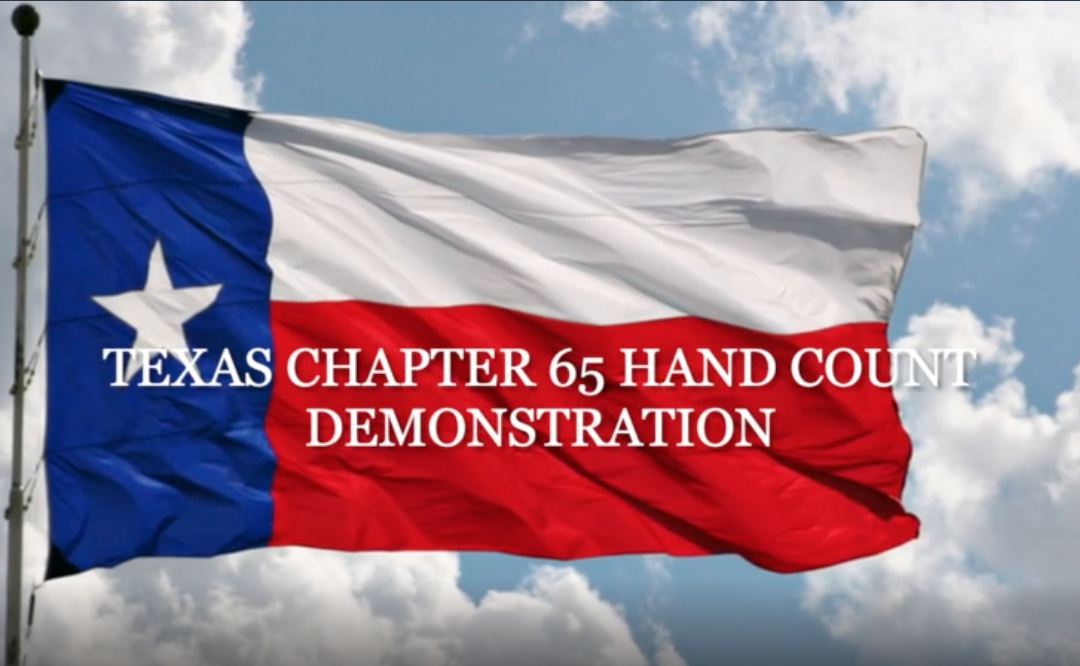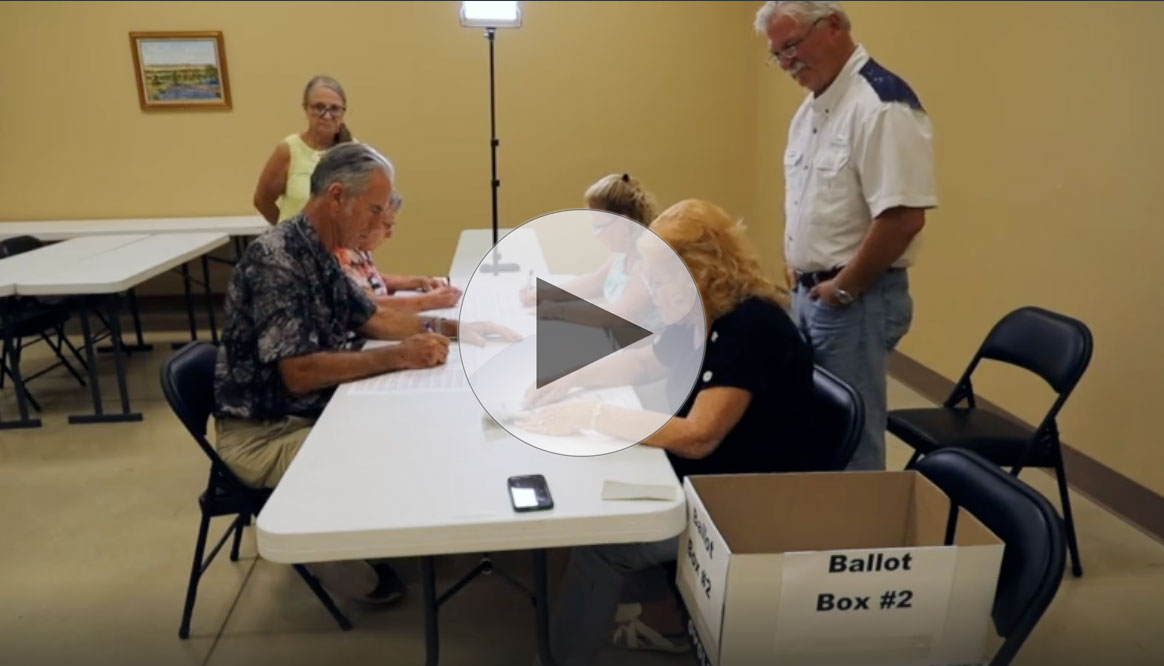Watch the video below that demonstrates the Chapter 65 hand count method.
What took the team 2 hours and 14 minutes to count 150 ballots (each 3 pages with 20 races) has been compressed into a video of approximately 11 minutes. There is a narration added to explain the process. The end result was complete agreement between all three tally sheets (100% accurate).
Citizens of Kerr County need to be involved in this transparent process! Contact Rich Paces with your interest in being a part. Any civic minded students over 16 years old can also serve as clerks and hand count.
Thank you to Commissioner Rich Paces’ for continuing to champion the need for election integrity in Kerr County!
Share this with others!
Share this with friends and neighbors.
Commissioner Rich Paces has submitted an article to the paper fully explaining “the why” of this effort – whether it gets printed remains to be seen. We have it for you below.
I understand that a petition “to support Bob Reeves and electronic voting and oppose Rich Paces” is being circulated by John Harrison and George and Judy Eychner. So first, I want to clarify that I too support Bob Reeves. I have never expressed a lack of confidence in Bob and his staff to run our elections. In fact, I have repeatedly stated that Bob and his team do a very good job running our elections. I would like to see him continue in this role and get the job done. I understand his concerns about hand counting ballots. It will take more effort. However, polls show that over 60% of all eligible voters do not trust our elections. I am one of them. But it is the electronic voting system, which is a black box outside of our staff’s control, that I do not trust. We shouldn’t need to find hard evidence of election fraud to realize our election systems have too many vulnerabilities and have lost the trust and confidence of our citizens.
Election integrity was the number one legislative priority coming out of the Kerr County Republican Convention as well as the Statewide Republican Convention last year in Houston. Unfortunately, little has been accomplished this year in our Texas legislative sessions with respect to enhancing election integrity other than restoring the felony offense charge for election fraud which had been reduced to a misdemeanor when Representative Murr’s HB6 passed during the 2021 legislative session.
On August 28th, the Republican National Committee (RNC) issued a resolution urging a return to excellence in American voting and elections. The RNC recognized that ensuring the integrity of our voting and election administration is critical and foundational to maintaining a civil and decent society decentralized from a federal government as the Founders intended and have resolved to support the rights of counties and states that are willing and able to competently and efficiently implement voting procedures that do not require the use of machines and those that implement hand counting procedures that are fully auditable. The RNC also calls on state legislatures, county, and municipal governments to pass laws and municipal codes and rules that allow for full transparent hand-counting procedures that are planned, timely and fully observable by the public and the registered parties for geographically defined audits and recounts.
Our elections ecosystem has numerous vulnerabilities, starting with our voter registration database, our e-poll books and our use of electronic voting machines. These vulnerabilities were all well defined in the recent Election Integrity Town Hall held on August 22nd by various experts (Kerr County, TX – Hand Count Road Show). Mail-in ballots are a major concern as is the extended period of in-person early voting. These aspects need to be addressed by our legislators in Austin and Washington DC. But there are several areas of concern that are within the authority of our Commissioners’ Court, such as the decisions to use only paper ballots vs touch screen electronic voting devices, whether to tabulate ballots using electronic machines vs hand counting, and the use of e-poll pads vs printing hard copies of our voter registration lists 30 days prior to the election by precinct for in-person voter verification.
Hand counting paper ballots has been used as a method to tabulate votes in Texas for many decades. Countries including Germany, Argentina, Australia, Canada, Finland, France, Ireland, Japan, Malaysia, Netherlands, Norway, Russia, Spain, Sweden, and the United Kingdom hand count paper ballots. Chapter 65 of the Texas Election Code governs how paper ballots are hand counted in Texas. This Chapter was established in 1985 and has been amended numerous times since. With the advent of electronic tabulating systems, hand counting ballots continued in only a few small counties and municipalities, like Fredericksburg. It is also used in contested elections to recount ballots. However, with growing concerns about the vulnerabilities of electronic voting systems, hand counting is seeing a resurgence. Interested in hand counting ballots? Read TEC Chapter 65. It’s only 11 pages. A local tally team got together to give a demonstration of a Chapter 65 ballot hand count at the recent Town Hall then got together again and made a video of counting 150 ballots similar to the November 2022 general election where there were 20 races on three pages to count. It took 2 hours and 14 minutes (1.12 ballots per minute or 67 ballots per hour). The video is being compressed with a voice over explanation of the process and will be available for viewing via a link I will provide.
On August 29th, the Gillespie County Republican Party Executive Committee passed a resolution to hand count paper ballots and use paper poll books in their upcoming 2024 Republican primary elections.
My hope is that Kerr County will use the Texas Election Code Chapter 65 hand count method to tabulate our ballots from the November Constitutional Election. The advantage of hand counting ballots in November on a trial basis is that this election is expected to have a relatively low turnout and we only have 14 races to count resulting in far fewer volunteers required.
As the total number of ballots received during early voting will be known, the presiding judge will make an estimate of the number of tally teams required based on the number of races on the ballot and the expected amount of time required to count each ballot (e.g. a three page ballot containing 20 races takes just under one minute to tally, a two page ballot with only 14 races should take 30% less time). Since once vote counting begins, no elections personnel may leave the polling location until the polls close, it may be preferable to start counting votes at 2 pm such that the tally teams only have to work for approximately 5 hours. There is no limit to the number of tally teams utilized to hand count votes, although sufficient room must be available.
Assuming fewer than 10,000 ballots will be cast in November and that the average tally team will be able to count 67 ballots per hour, it will take 149 hours, which if teams work on average 5 hours, would require 30 teams equating to 120 people (excluding any poll watchers) on election day. As absentee and early voting ballots are expected to make up around 70% of the total ballots cast (similar to the 2022 general election), up to 20 tally teams will be required in the central counting facility, again assuming that counting begins at 2 pm and is completed by 7 pm. As only four election day polling locations have been established for November, and less than 3000 ballots are likely to be cast on election day, a total of nine tally teams may be required to complete counting on election day in the precinct locations working from 2–7 pm.
Election officers, including judges, clerks and poll watchers must complete the SOS online training as well as any specific training that the entity authorizing the election may require prior to serving at the polls. The online training may be completed at your own pace and a certificate is provided at the end of the program. While tallying votes is very easy, it is important that the tally teams undergo some training and a practice round prior to Election Day to ensure smooth, timely and accurate vote counting. As the SOS clarified that the tally teams should be comprised of judges and clerks, they will receive financial compensation for their time. Our commissioners court recently approved the payment of $12.50 per hour for poll workers. While this adds some cost ($7500 for 120 volunteers each working 5 hours) to our elections, it is far preferable to put this money in the hands of our local citizens rather than a large corporation. If we stop using electronic voting machines, we will actually save money by eliminating capital equipment lease payments and annual software upgrades and maintenance expenses.
In summary, hand counting ballots using the Texas Election Code Chapter 65 method has been around for decades and is a proven method for tabulating votes needing no approval from the SOS. It is easy, accurate and very transparent. It does, however, require a much larger number of civic minded citizens to step up and invest some of their time to restore confidence in our elections. Chapter 65 has robust checks and balances with three Markers and a watcher(s) looking over the shoulder of the Caller, making it transparent and accurate. We already have over 400 citizens in Kerr County who have signed up to count ballots. So why not give it a try? What do we have to lose?
I am not so naïve as to think that there will not be difficulties encountered in hand counting ballots. However, by working with people who have experience working elections and especially those who have experience hand counting along with the support of the SOS elections staff, I am confident that we can work through all the concerns of those opposed to hand counting.
It is important to do so as our Commissioners Court has been informed that the Hart InterCivic Verity 2.4 voting system that we have been using does not have a valid certification from the Election Assistance Commission. The issue here is that the voting system test laboratory (VSTL) certificates of accreditation are invalid. There are only two VSTLs approved for testing voting systems by the EAC. However, neither has a valid certificate of accreditation. Hence if we adopt and use a voting system that is not fully compliant with the legal requirements for an election system, then our court is violating the law and exposing Kerr County to election result contestation lawsuits not to mention exposing those approving the use of unlawful voting system equipment to removal via Chapter 87 of the Texas Local Government Code. Hence, until this accreditation issue is properly addressed, the only legal means to hold our elections is to hand count paper ballots using the Chapter 65 method.
Rich Paces
Kerr County Commissioner, Precinct 2


